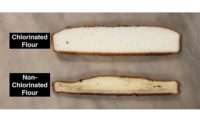
Maybe the old adages that our parents used to admonish us with, such as “drink your milk,” and (at least in my mother’s case), “get outside - you need your Vitamin D,” weren’t so far off. We’re hearing more and more about this vitamin, which has been well identified for its role in improving growth and building bones. But new findings are uncovering why a deficiency of Vitamin D can play a major role in serious illnesses. More and more coverage of the sunshine vitamin is surfacing, so maybe those scolding words to “get more Vitamin D” aren’t such a bad idea.
Exposure to the sun is one of the easiest and natural ways to absorb this fat-soluble vitamin, though no one wants to sun too long. It’s also found in eggs, fish and cod liver oil.
I’d rather drink the fortified milk, thank you.
There are plenty of ways adequate intake of Vitamin D can enhance health. But how does it and will it fit into the bakery and snack food businesses? What solutions are there for Vitamin D inadequacy and deficiency? Is exposure to the sun a safe way to increase Vitamin D intake? These and many more questions are on the minds of many bakers, snack food producers and consumers.
Scientists continue to discover things about Vitamin D that more closely tie it to preventing certain cancers and auto-immune diseases. This has lost nothing on the baking and snack sectors, which have been enhancing or fortifying their respective products with Vitamin D to improve healthful benefits in everything from baker’s yeast for breads to cereals and meal replacement bars.
Studies show that researchers who are mapping information that can be used to identify disease-related genes that might be influenced by Vitamin D (called Vitamin D receptor binding) seem to indicate that the vitamin may be more powerful than first thought. The risks associated with deficiencies of the vitamin, especially for those who are genetically predisposed to Vitamin D deficiency, are highly substantial, the authors explained in a news release from Cold Spring Harbor Laboratory.
Higher Vitamin D intake also may help guard against diabetes and heart disease, according to research that also claims it helps maintain the body’s calcium balance, aids in cell differentiation and in regulating blood pressure. The vitamin also may play a role in insulin secretion. While milk has been fortified with Vitamin D for many years, bakery products and ingredients would have to be fortified with enough of the vitamin to be labeled as such. Some bakers say they either can’t fortify their products at high enough levels to make it worth doing or won’t, for whatever reason. But others are willing to make that change, as they develop and market new bread products that can labeled as a good source of Vitamin D.
Vitamin D is one of the nutrients topping the list when it comes to fortifying childrens’ foods, according to a new report published by Bio2com in collaboration with Mintel. The Kids Health and Nutrition 2010 survey monitored functional ingredient usage and product launches across Europe, Asia and the Americas over the past year.
To delve further into the matter, last month I participated inSnack Food & Wholesale Bakery’swebinar, “Vitamin D, an Opportunity for the Baking Industry” (visit our website at www.snackandbakery.com to register - yes, you still have access!).
The webinar featured speakers Michael F. Holick, director of the General Clinical Research Unit and professor of medicine physiology and biophysics at the Boston Medical Center; Wendy J. Dahl, assistant professor of the Food Science and Human Nutrition Department at the University of Florida; Connie M. Weaver, distinguished professor and department head of Foods and Nutrition at Purdue University; and Dennis Gordon, professor emeritus, North Dakota State University, former chairman of Cereal Science and an advisor to Lallemand/American Yeast, the Canadian-based sponsor of the webinar.
These presenters are all heavy hitters in the health area. In fact, the webinar panel discussion was an intriguing one and included discussions on how increased Vitamin D intake can reduce the incidence of many chronic conditions that have sometimes been blamed on refined grains.
I encourage you to check out this webinar. These scientists and industry experts shared many thoughts and insights on Vitamin D and mentioned a few breakthroughs and success stories centered around the inclusion of Vitamin D, as well as a question and answer session.
The bottom line is that adequate amounts of the vitamin-and there’s much debate about those specific amounts - would reduce the incidence of many chronic conditions that have been wrongly blamed on refined grains. With the stakes so high, the baking and snack communities must not take a passive role as the Vitamin D story continues to unfold. Stay tuned. We’ll no doubt be learning more about what some are calling a possible “wonder” vitamin.
Lauren R. Hartman, chief editor
hartmanl@bnpmedia.com



